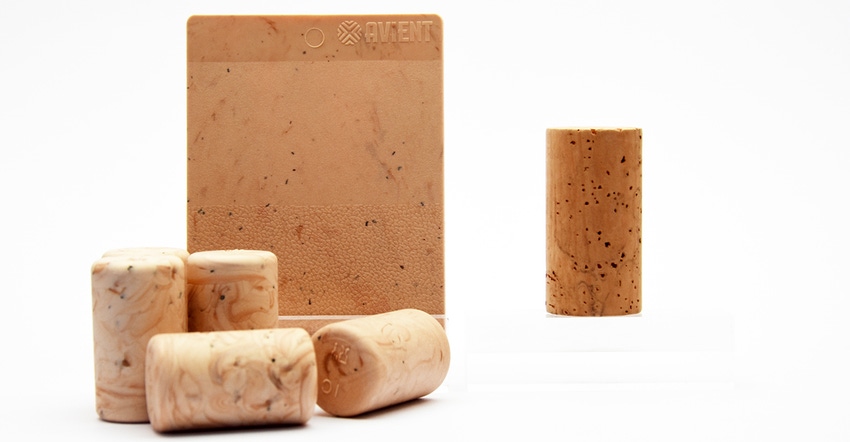Avient has introduced a “special-effect” masterbatch that results in natural-looking wine corks molded from thermoplastic elastomer (TPE).
June 11, 2021

Wine lovers — and I am one — admittedly are a strange breed. Consider their commitment to natural cork. It can break and crumble before it is fully removed from the bottle, causing untold frustration in a vain attempt to keep cork crumbs from falling into the wine. And how many bottles of wine are ruined by cork taint annually? I return about a half-dozen bottles to my friendly neighborhood Trader Joe’s every year because of corkage. Yet, many vintners and consumers are loathe to abandon natural cork. The screw cap? Vous plaisantez! A heresy. The plastic cork? Well, on the plus side, it preserves the ritual mediated by the corkscrew, and it won’t taint the wine. It may, however, affect the all-important aging process. And, well, it looks and feels like plastic — in the bottleneck of a Bordeaux, that will just rub some oenophiles the wrong way. Setting aside the complexities of aging that natural cork facilitates, Avient thinks it may have found a material solution to the quibble over aesthetics — a “special-effect” masterbatch that produces natural-looking wine corks from a thermoplastic elastomer (TPE).
Marketed under the Renol and Remafin brands, the formulation was developed by Avient ColorWorks in Merate, Italy. The so-called special effect makes every TPE cork look different, marked by a light brown swirl pattern and random black specs, explained Avient. The material complies with FDA and EU food-contact regulations, and the corks can be injection molded with standard equipment at a price point that reportedly is competitive with natural corks, which, incidentally, are in limited supply right now, according to Avient’s Daniele Conti.
"Several trends are pushing the wine industry to find alternatives to natural cork,” explained Conti, a polymer scientist on the ColorWorks team, in a prepared statement. “Climate change and related drought events are reportedly hindering the growth rate of cork trees, and supplies are limited. Natural cork, and even corks made of ground natural material, can allow oxygen to enter the bottle, occasionally spoiling the wine. TPE corks don’t have these problems, but they are obviously synthetic substitutes and don’t give wine enthusiasts the same aesthetic experience as the natural product. We have been able to develop a special-effect masterbatch that makes a natural-looking TPE cork, providing the aesthetic pleasure of natural cork together with the improved performance of TPE,” said Conti.
Avient said that prototype corks using the special-effect formulation in combination with TPE from Italian compounder Marfran Srl were trialed by a manufacturer to prove the concept of creating a more natural-looking wine cork. “The new masterbatch package from Avient enables us to enter the wine cork market with a Marfran TPE and foaming agent that complies with the necessary food-contact requirements and the visual effect of genuine cork,” said Francesco Francheschetti, President of Marfran. “It also allows us to deliver good moldability and resistance to sterilization. The first trials by some of the main participants in the wine cork market have been very positive,” he added.
While I don’t doubt the aesthetic qualities of the TPE cork, I do know that some wine aficionados will question the material’s effect on the wine itself. Natural cork is an elastic material that expands within the bottleneck to seal in the liquid and keep out oxygen. TPE certainly is up to that challenge. However, natural cork has tiny pores that allow minuscule amounts of air to interact with the wine, notes an article in Wine Enthusiast, “The Pros & Cons of Different Wine Closures.” That process “can transform the aroma and flavor over time. This makes cork the top choice for producers of age-worthy wines,” writes Christina Pickard.
Can a TPE cork make the same claim? Only time will tell.
About the Author(s)
You May Also Like




